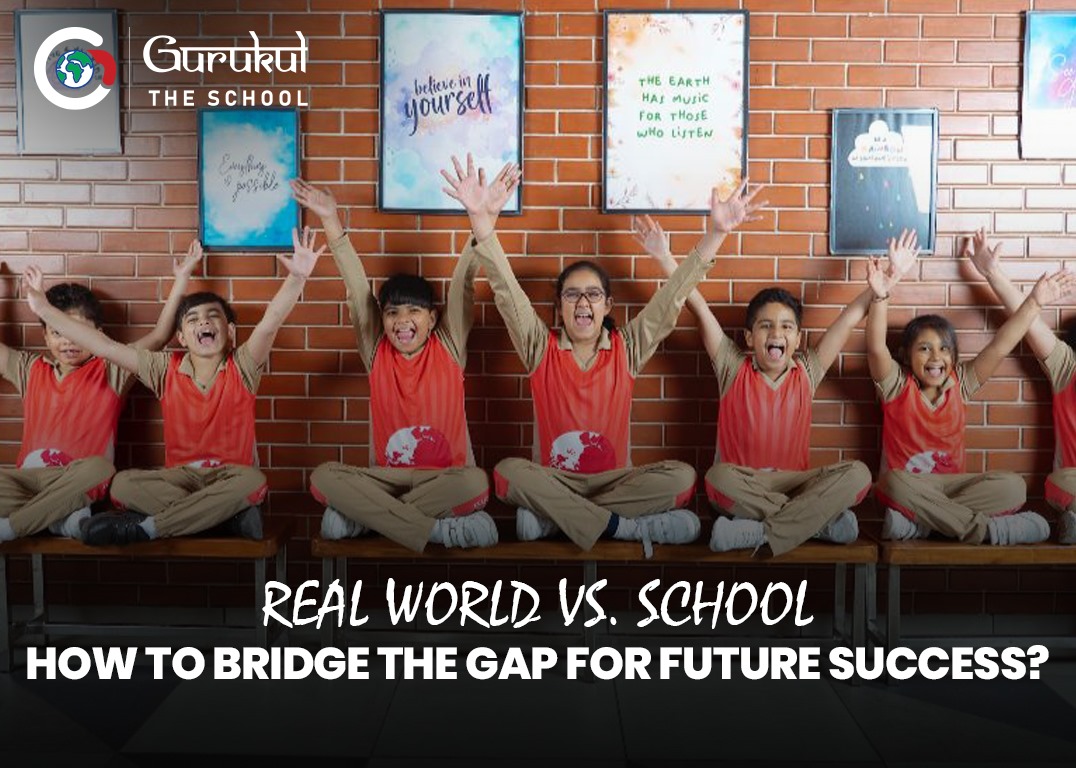Real World vs. School: How to Bridge the Gap for Future Success?
posted on Mar 20, 2024
We at Gurukul The School, one of the top 10 school in ghaziabad

Have you ever experienced jarring scenarios where you struggled to write a compelling email to your senior, even though you could easily write paragraphs in school exams? Or you were a pro at solving complex mathematical equations at school but trying hands-on house budgeting made numbers feel alien to you. These are a few shared experiences most students face after finishing their official academic journey and entering the real world. Although schools of earlier times provided an excellent learning ground, they focused too much on imparting knowledge and setting foundations through theoretical learning.
It created a wide gap between what is being taught inside the four walls and what the real world awaits for students outside. We at Gurukul The School, one of best school in Ghaziabad, believe modern educational institutes have identified this drawback and are actively working to fix it. Most 21st-century schools are now delivering education using the right blend of theoretical and practical-driven learning experiences so students are well-prepared to thrive in the real world. But what about schools that refuse to embrace a new learning approach? How will their students bridge the gap between real-world and school experiences?
We believe every child, regardless of the institute they’re studying at, can take practical steps to bridge the gap between school and the real world, securing their future success. To make the journey easier, we have handpicked the following tips that can be implemented for tangible success.
-
Practicing the Budget Balancing Act
We all have learned basic to advanced mathematical concepts at school, but how smoothly can one apply those learned concepts in the real world? While there can be exceptions, many find it challenging to suddenly deal with numbers in real life instead of figures on a piece of paper. This is why we at Gurukul The School encourage all of our students to practice the budget-balancing act. It is a tip designed to help children bring theoretical knowledge into everyday practical usage.
For example, children should start treating their allowance or monthly pocket money as earnings and all their spending on clothes, toys, snacks, etc., as expenses. They can maintain a diary as their personal budget planner and try to create a budget, allocate money diligently, and keep everything balanced. This math drill fosters a sense of financial literacy, so children learn to prioritize needs, make tough decisions, and understand the real-world consequences of not saving enough or overspending.
-
Becoming a Persuasive Communicator
We are sure all of the modern world schools are doing an excellent job of teaching grammar, vocabulary, etc., to children, but are all of them able to use this knowledge well? Unfortunately, most cannot. Since persuasive, clear, and confident communication is a priceless skill that helps children throughout their life, we recommend honing communication skills from a young age.
Use the information taught at school as foundational speech blocks and build upon them to strengthen communication skills. This exercise aims to transform passive listeners into confident speakers. While there are numerous ways to sharpen communication skills, we recommend participating in group decisions, volunteering for presentations, honing public speaking skills by taking up cohorts, etc. This one skill can help children in all areas of their life, right from landing their dream job to expressing their feelings clearly to loved ones, and more.
Nothing beats a curious mind. As such, it is important that children strive to foster their curiosity instead of memorizing facts and other forms of knowledge. A curious mind always enables children to dive deeper into any topic that piques their interest. Instead of passively accepting any information, children with curious minds delve into researching the topics independently to frame conclusions and find information they might have otherwise missed.
Children can use curiosity to find connections and make sense of the world around them. For example, their curious mind can tempt them to learn about the historical event that sparked a technological innovation and the events that followed, their impact on the world, their interconnectedness, and much more. At Gurukul The School, we firmly believe that a curious mind is where the love for lifelong learning is nurtured. It is hence wise to tap into the curious side of your children and make them wear their creativity hats.
Conclusion
We at Gurukul The School, being one of the most highly trusted top schools in Ghaziabad, would like to mention that though educational institutions are imperative to lay a strong learning foundation for children, they shouldn’t be considered the only place of learning. It is important to ensure that the learning experiences that children are soaking at school are further built upon and strengthened through their own real-world experiences. Most of the things taught in school can be applied in the real world and improved with consistent practice and effort. Those feeling directionless can start by implementing the tips discussed in this blog post and notice significant improvement over time. Once children get into the habit of bringing theoretical concepts into practical, real-world usage, they can continue exploring the world, fully prepared to thrive even in the most competitive landscapes.